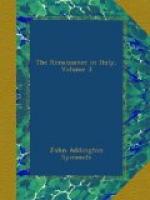Through mist, a heaven-sustaining bulwark, reared
Between the east and west; and half the sky
Was roofed with clouds of rich emblazonry,
Dark purple at the zenith, which still grew
Down the steep west into a wondrous hue
Brighter than burning gold, even to the rent
Where the swift sun yet paused in his descent
Among the many-folded hills—they were
Those famous Euganean hills, which bear,
As seen from Lido through the harbour piles,
The likeness of a clump of peaked isles—
And then, as if the earth and sea had been
Dissolved into one lake of fire, were seen
Those mountains towering, as from waves of flame,
Around the vaporous sun, from which there came
The inmost purple spirit of light, and made
Their very peaks transparent. “Ere it fade,”
Said my companion, “I will show you soon
A better station.” So, o’er the lagune
We glided: and from that funereal bark
I leaned, and saw the city; and could mark
How from their many isles, in evening’s gleam,
Its temples and its palaces did seem
Like fabrics of enchantment piled to heaven.
With this we may compare the following extract from a letter, addressed in May 1544 to Titian, by one of the most unprincipled of literary bandits who have ever disgraced humanity, but who nevertheless was solemnised to the spirit of true poetry by the grandiose aspect of nature as it appeared to him in Venice. That Pietro Aretino should have so deeply felt the charm of natural beauty in an age when even the greatest artists and poets sought inspiration in human life rather than the outer world, is a significant fact. It seems to illustrate the necessity whereby Venice became the cradle of the art of nature.[266] “Having, dear Sir, and my best gossip, supped alone to the injury of my custom, or, to speak more truly, supped in the company of all the boredoms of a cursed quartan fever, which will not let me taste the flavour of any food, I rose from table sated with the same disgust with which I had sat down to it. In this mood I went and leaned my arms upon the sill outside my window, and throwing my chest and nearly all my body on the marble, abandoned myself to the contemplation of the spectacle presented by the innumerable boats, filled with foreigners as well as people of the city, which gave delight not merely to the gazers, but also to the Grand Canal itself, that perpetual delight of all who plough its waters. From this animated scene, all of a sudden, like one who from mere ennui knows not how to occupy his mind, I turned my eyes to heaven, which, from the moment when God made it, was never adorned with such painted loveliness of lights and shadows. The whole region of the air was what those who envy you, because they are unable to be you, would fain express. To begin with, the




